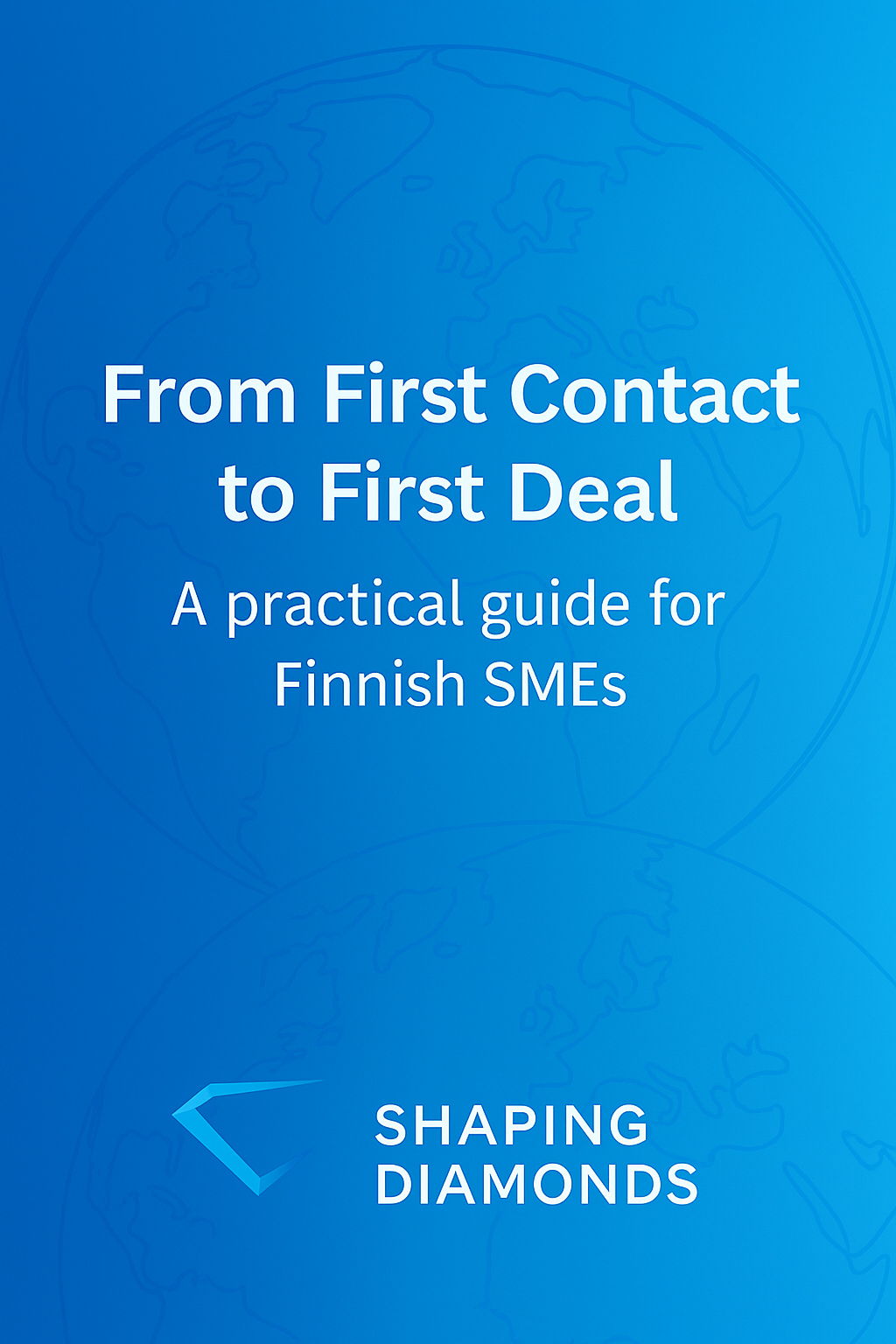(For Finns, silence is comfortable. For Germans, it’s a red flag — here’s how to bridge the gap.)
If you’ve ever sat in a German business meeting as a Finn, you’ve probably noticed a few cultural differences. The small talk starts early, the meeting agenda is detailed to the minute, and by the time you’ve mentally finished your first coffee, someone’s already asking about your quarterly projections.
Welcome to Germany — a market where trust takes time, communication matters, and relationships are built, not assumed.
We’ve been here for a while as a Finnish-owned company, and along the way we’ve learned how to turn first conversations into real, long-term partnerships. Here’s what we’ve discovered.
1. Trust is earned slowly — and lost quickly
In Finland, a handshake and a few shared words can already mean you’re “doing business together.”
In Germany, things move differently. Trust builds over time — through consistency, reliability, and yes, paperwork.
German partners want to see that you’re serious, structured, and here to stay. They don’t expect perfection, but they do expect follow-up and transparency.
Our advice:
Show up prepared, meet your deadlines, and communicate clearly — even when things go wrong. Reliability isn’t a nice-to-have here; it’s the foundation of every business relationship.
2. Communication: be clear, not cryptic
Finns often value brevity. We like to say less and mean more. Germans… not so much.
Here, clarity and precision in language are signs of professionalism — not micromanagement.
A German partner might want to discuss every detail of a project before signing, not because they doubt you, but because that’s how they build confidence.
How to bridge the gap:
- Put agreements in writing — even small ones.
- Confirm next steps after meetings.
- Don’t hesitate to restate what was decided — it’s seen as helpful, not patronizing.
And yes, silence isn’t golden here. It’s confusing. If you disappear for a week, your partner might assume something’s wrong. Regular updates go a long way.
3. “Small Talk” isn’t small at all
We know — in Finland, chatting about the weather is something you do when there’s truly nothing else to say. But in Germany, small talk is part of how people get to know you. It’s a warm-up, a way of showing interest and approachability before diving into business.
Our tip:
Come prepared with a few safe topics: travel, sports, culture, maybe even the latest Finnish tech innovation. Avoid overly personal subjects or politics — but don’t be afraid to engage.
If you skip the small talk and head straight to business, you might come across as distant or uninterested — even if that’s just your inner Finn trying to be efficient.
4. The Power of Face-to-Face
Yes, Germany is digital. But many partnerships here still begin — and strengthen — in person.
Trade fairs, industry events, and local meetups are goldmines for relationship-building. Germans appreciate the effort of showing up, shaking hands, and talking business over lunch.
Practical advice:
- Attend key trade shows in your field (there’s one for everything).
- Plan follow-up meetings afterward — Germans value continuity.
- Bring printed material. It’s still surprisingly effective.
Your physical presence signals commitment, something that can’t be replicated through a Zoom call.
5. Respect structure (and hierarchy, at least a little)
Finnish workplaces tend to be flat — we call the CEO by their first name and question decisions freely. In Germany, the hierarchy is often more formal, especially in traditional industries.
That doesn’t mean you can’t be open or friendly — but it does mean you should understand who makes the decisions and address people appropriately. Titles matter more here, especially in the first stages of cooperation.
Hint: A little “Herr” or “Frau” at the start goes a long way. Once the relationship warms up, formality fades naturally.
6. Play the Long Game
In Germany, partnerships are built to last.
Don’t rush the process or expect immediate results. Germans tend to start small — a pilot, a test order, a single project — before committing long-term.
Once you’ve proven yourself, though, loyalty runs deep. Many German clients stay with the same partners for years, even decades.
Takeaway: Focus on being dependable, consistent, and patient. Think marathon, not sprint.
In Short:
Building partnerships in Germany isn’t about flashy pitches or overnight deals. It’s about showing up, following through, and earning trust step by step.
If you can combine Finnish honesty with German structure, you’ll find that the two cultures actually fit together remarkably well.
Both value quality, dependability, and keeping one’s word — they just express it a bit differently.
And if you ever find yourself overthinking whether to send that follow-up email — just send it.
Your German partner will appreciate it, even if your inner Finn cringes a little.
Thinking About Growing in Germany?
We’re happy to share what we’ve learned — from navigating small talk to surviving your first trade fair.
Drop us a message; we’ll bring the experience.



